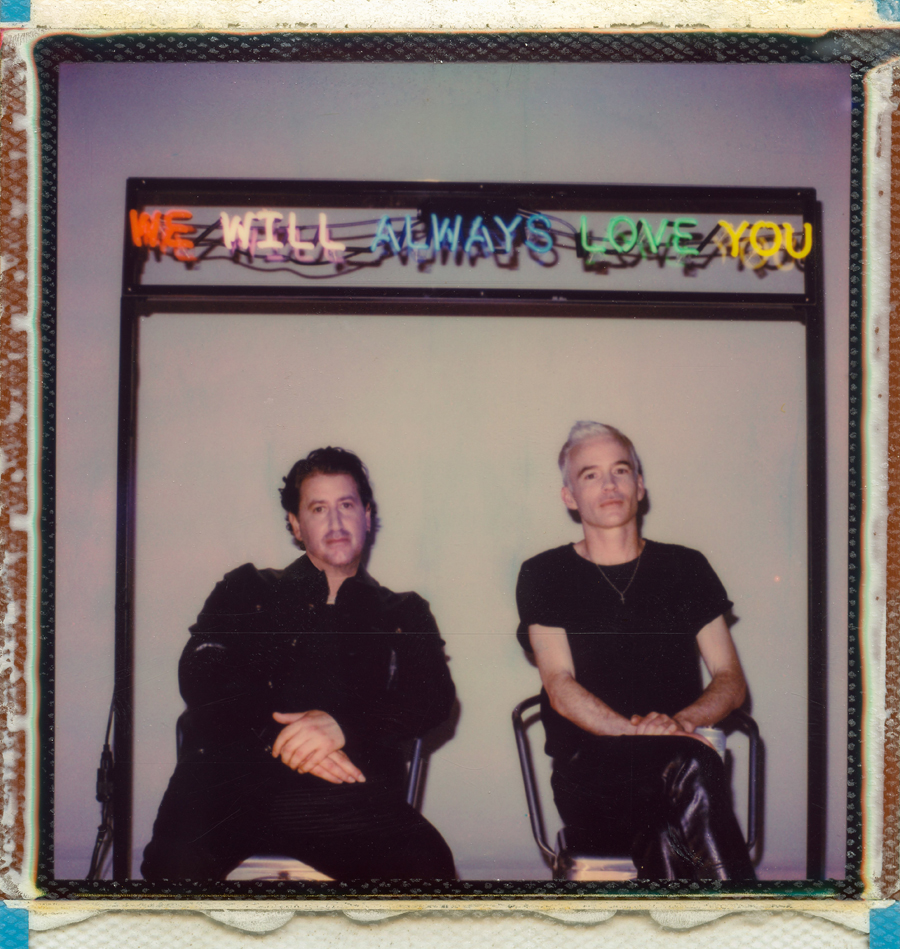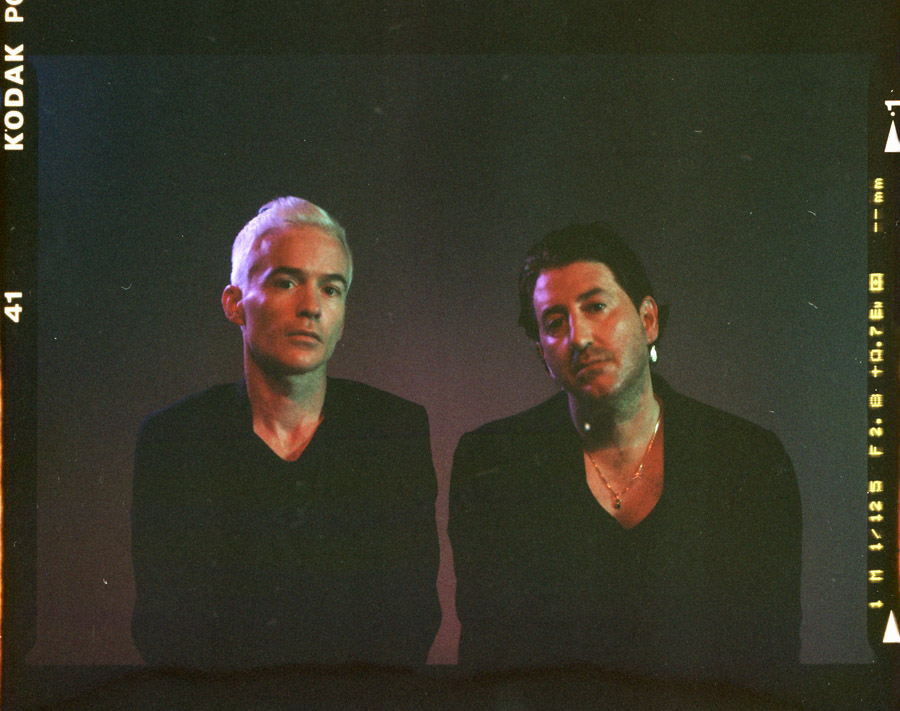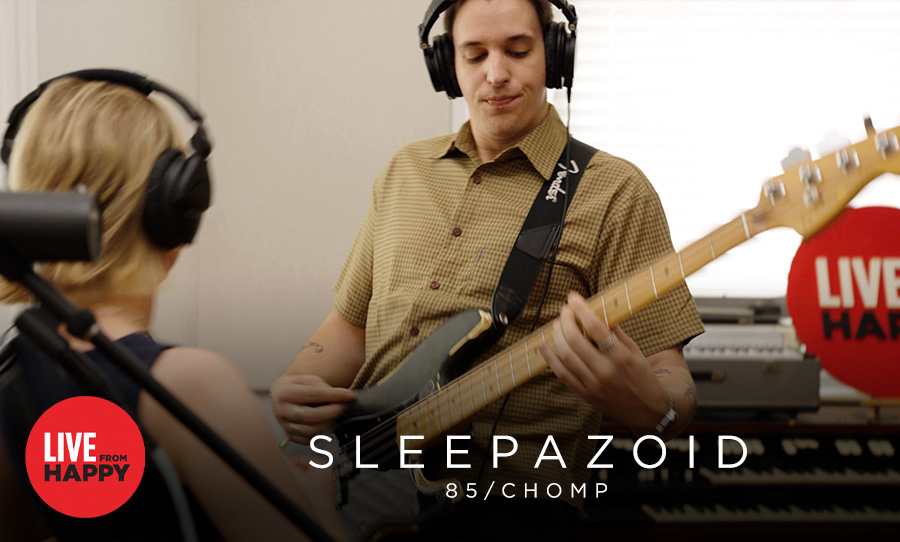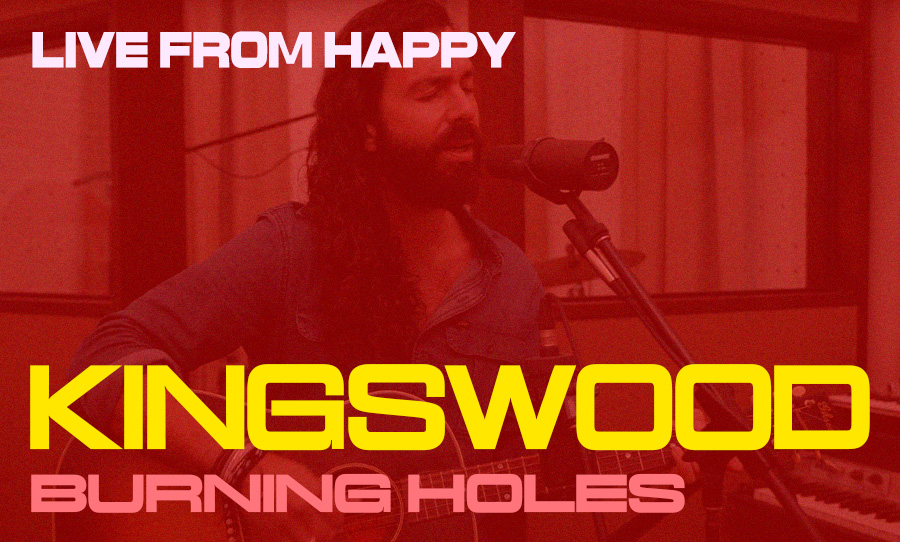Twenty years ago, The Avalanches released Since I Left You, a work that elevated the art of sampling and became its defining statement. As quickly as the band entered the spotlight’s glow, they departed it, until they reemerged a full sixteen years later with the similarly dense, yet more collaborative, Wildflower.
So in the oeuvre of The Avalanches, there’s hardly a precedent to lean on: which is just the way they like it. This time — a mere four years since their last record — the duo consisting of Robbie Chater and Tony DiBlasi has returned with We Will Always Love You.
We spoke with Tony DiBlasi about the message of love that permeates the album, the intensely creative and collaborative process on making it, and the importance of paying tribute to the ‘forever’ voices.

HAPPY: Thanks for connecting with us from your home town of Melbourne. I know a lot of We Will Always Love You came together in L.A. but do you still work on a lot of Avalanches material at home?
TONY DIBLASI: Most of the music was done in Melbourne, so we’re still based here. It’s just that we went away a few times in the preceding years and recorded in some studios over there. We kind of mixed over there, but it was more just like running everything through the desk, but most of the music made in Melbourne, definitely.
HAPPY: I’d imagine that the whole mix process for an Avalanches record would be very important, more so than for other bands, because you’re sorting through so much material. Can you talk about how a certain desk or a certain studio is important for you guys?
TONY DIBLASI: So we mix it in the box, in Pro Tools, and do as much as we can that way, but that’s very ‘digital’ in sound. So what we did is just run a few outs through a beautiful API desk they had in Sunset Sound in L.A. and we just run that through at different levels. It’s almost using it just as a compressor.
We’d run it through at different levels and be like “ok, plus 1, plus 3, ok it’s taking too much off the tops“, and each song was different in how it hit the desk. It just warms it up a touch and clicks it all into shape a bit better. The other records involved mixing each track through the desk, but this time we weren’t even using any of the EQs on the desk, it was literally just running it through to give it the sound of the desk.
The desk we used was one that Prince loved. He set up a bed in the vocal booth and he made them put up a basketball ring in the backyard that’s still there because he just loved playing ball, so that’d be what he would do between takes.
HAPPY: We Will Always Love You features myriad vocal collaborations. How do you approach a session with a vocalist you’ve never worked with before?
TONY DIBLASI: It’s always different depending on the artist. I guess it was about half were done with the artist in the studio and the rest were remote, but still, it’s always different with each artist.
HAPPY: And when you’re working remotely with a singer, are you suggesting recording gear and techniques, or do they have a blank check to record it however they like?
TONY DIBLASI: Robbie had a series of notes that emphasised what we were going for with the record, themes and everything like that. Just working with so many different vocalists we were quite wary of making sure the theme was cohesive.
They would kind of get on board and interpret what we sent them through their own prism and come out with their own lyrics. So we just guided them with the concept, but creatively, we let them go with whatever they wanted to do.
I mean you’re working with such amazing artists, it’s hard to give them pointers (laughs). Sometimes we felt like giving them melodic ideas, but you’re better off just letting them do it their way. Just give them free rein and see what comes back is always the best way to go.

HAPPY: Do you have an idea of which direction a song might take before you start a collaboration? Specifically, I’m thinking of what might be a full track and what might be an interstitial, which is such a feature of the new record.
TONY DIBLASI: I guess it comes down the performance itself. A lot of the interludes were things that we thought wouldn’t be full tracks in the first place. It definitely comes down to a song-by-song basis. And when we choose the collaborators, we’ll have a sketch of a sample and a draft of the song and we’ll go “ok, who’s voice do we think will sound good with this?”
A lot of the time we’ll just sample, say, Tricky [who features on the tracks Until Daylight Comes and Take Care in Your Dreaming] and bring in his voice over the song and think how does that tonally feel?
HAPPY: Throughout the new album, there’s more apparent empty space compared to Since I Left You and Wildflower. Was that a deliberate effort, or more just a reflection of your state of mind at the time?
TONY DIBLASI: It was definitely a conscious effort to be less dense. With the density of our previous releases, it’s hard to get loud and mix really bright. In Wildflower and Since I Left You, whatever bass was in the sample was the bass you were gonna get. This time we collaborated with our friend Andy [Szekeres] and he’s an amazing musician, so we filled out the spectrum a lot more.
It was also just the learning curve of working with these great singers. There needs to be space around the voice as well. You can sometimes go over the top with the density, but when you’ve got a beautiful lead vocal, you won’t be able to hear those little echo trail-offs or reverb tails. In Reflecting Light, you’ve got a beautiful voice like Sananda [Maitreya] and we had to take stuff away to really let that shine.
HAPPY: About Reflecting Light, the connection between the contemporary voice and the ‘forever’ voice, as you call it, is particularly intriguing. The sampled voice is given equal footing alongside the new performance. Is there a guiding principle there?
TONY DIBLASI: It’s definitely, always, whatever is best for the song. Reflecting Light had the Vashti Bunyan sample in it before we sent it to Sananda, so he was bouncing off that. So that idea was kind of beautiful to us — he could hear the sample and that would inspire his own lyrics and melodic arrangements.
HAPPY: On the flip side of that, were there any examples on the album were establishing the connection between the forever voice and the new voice was a real challenge?
TONY DIBLASI: Maybe the hardest one to process was the Karen Carpenter song, with Cola Boyy and Mick Jones [We Go On] because the voices were so different. Cola Boyy and Mick Jones have, not jarring, but very rebellious, upfront, in your face, kind punky vocals and Karen’s is quite beautiful.
So in our minds, we found that kind of hard to process. We were thinking, is this gonna weird people out too much? But in the end, it felt like a nice juxtaposition. Karen Carpenter’s voice is just so pure and magical, then it was offset by those two guys. But that was a difficult one, just to process mentally.
HAPPY: That seems to be the tension that has filtered through all The Avalanches’ work and part of the magic as well, even though I can imagine you guys tearing your hair out in the studio sometimes…
TONY DIBLASI: (laughs) Yeah, we go “Does this make sense?” Because we’ve got pretty weird tastes, sometimes we’ve really gotta pull ourselves back and go “are we just going too far here?” We really do want to honour and pay our respects to people like Karen Carpenter, who’s deceased and who has such a legacy. We don’t want to dishonour that sample, so we want to make sure we’re using it in the right way.
With our sampling background, we’re used to using something from the ’40s and blending it with something from the ’70s and kind of just making it all work. We’ve had a lot of practise in mixing eras and genres, so the new way of connecting new and forever voices feels like an evolution from that.
HAPPY: You identify the relationship between light, sound and spirit as a central pillar of We Will Always Love You. How is that reflected in the technical decisions when you’re putting the record together? Is there a sonic equivalent?
TONY DIBLASI: What we did to reinforce that was sampling a lot of static and little transmission sounds. We even found a lot of stuff on YouTube from people who claim to channel the dead. There are these things called ‘ghost boxes’ which give out a kind of static sound. We sample that and layer it with other things and use them over the top of hi-hats, for example, to bring it through in that kind of way.
HAPPY: This seems to be most apparent on the final track Weightless. It’s oddly moving even though we know it’s just a series of robotic bleeps…
TONY DIBLASI: But there is a message behind it. Yeah, even though it is this bleepy, morse code there is a deeper message behind it. We try and reflect it with the music and the little things like static. You don’t think it matters, but it all adds to this textural ambience that the whole record has. If you take away things like that, you really notice it. There are things in the record you might not even hear, but you’ll just feel. That’s what we really tried to go for with this one.
HAPPY: And since sampling is right at the core for you guys, are you still relying on the same samplers from the Since I Left You days?
TONY DIBLASI: No. We had an [AKAI] S-900 and then an [AKAI] S-2000 for Since I Left You and then we had an [AKAI] S-5000 for Wildflower, that we both used. But now we’re mainly just using Pro Tools as a sampler. You can kind of do the same things and it’s just an easier workflow. Robbie sometimes thinks he might go back to the S-5000, but I don’t think he will. It’s just so much easier. We really did declutter everything after Wildflower. We bought a whole load of outboard gear after Since I Left You but it just got in the way of a turntable, or YouTube. We just put it into Pro Tools and just went for it.
HAPPY: The spark of inspiration from the relationship between Ann Druyan and Carl Sagan is quite specific. Did that inform the direction from the beginning, or did that emerge as the record was progressing?
TONY DIBLASI: It emerged as we were making it and it just captured the essence of what we were thinking about. The ideas of We Will Always Love You, and pure love, and space. Ann Druyan wanted to record her brainwaves and heartbeat and put that on the Voyager, for potentially intelligent life to find.
She was hoping that whoever found it was so intelligent that not only could they understand her biology, but they could read her mind. So when she was having her brainwaves recorded, she was meditating on the power of love. That sums up the positivity that we were trying to put out there as well. It’s quite negative what we see and hear, it’s all just this massive shitshow. So to send out into space an example of pure love, and humanity at its best is really inspiring. We should do that more.
HAPPY: Thinking about the future, do you take a break after the whole album production process? Or are you already thinking about the next body of work?
TONY DIBLASI: We’re starting to think about it. Wildflower was similar to Since I Left You in the way that it was very sample-based, but even completing Wildflower was a success to us. So we felt free to make a little departure with this one and not make it so sample-heavy. With the next one, we’ll try to do something different again.
There are so many bands that hit on a sound and get successful and that’s all they’ll do. Even if the records are great, after a while, it just becomes a bit of a known quantity. We never want to become that known quantity. It’s always good to surprise people because that’s the kind of music that we love. We’ll always be trying to push those boundaries.



